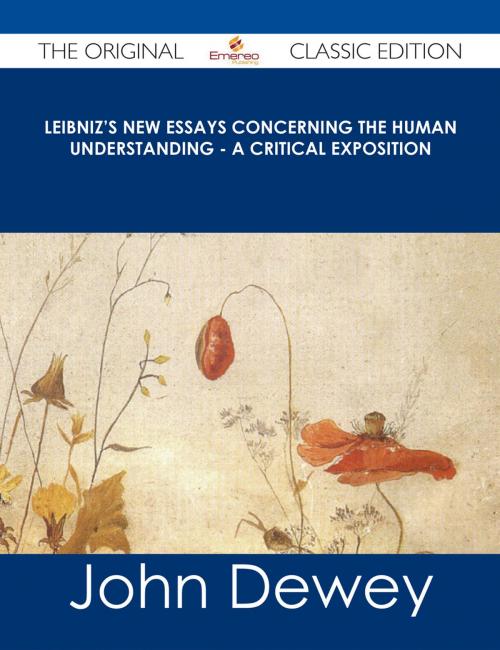Leibniz's New Essays Concerning the Human Understanding - A Critical Exposition - The Original Classic Edition
Nonfiction, Reference & Language, Reference, Fiction & Literature| Author: | John Dewey | ISBN: | 9781486443802 |
| Publisher: | Emereo Publishing | Publication: | March 18, 2013 |
| Imprint: | Emereo Publishing | Language: | English |
| Author: | John Dewey |
| ISBN: | 9781486443802 |
| Publisher: | Emereo Publishing |
| Publication: | March 18, 2013 |
| Imprint: | Emereo Publishing |
| Language: | English |
Finally available, a high quality book of the original classic edition of Leibniz's New Essays Concerning the Human Understanding - A Critical Exposition. It was previously published by other bona fide publishers, and is now, after many years, back in print.
This is a new and freshly published edition of this culturally important work by John Dewey, which is now, at last, again available to you.
Get the PDF and EPUB NOW as well. Included in your purchase you have Leibniz's New Essays Concerning the Human Understanding - A Critical Exposition in EPUB AND PDF format to read on any tablet, eReader, desktop, laptop or smartphone simultaneous - Get it NOW.
Enjoy this classic work today. These selected paragraphs distill the contents and give you a quick look inside Leibniz's New Essays Concerning the Human Understanding - A Critical Exposition:
Look inside the book:
And who can fail to see in the impartiality, the comprehensiveness, of his self-education the prophecy of the time when he can write of his ideas that “there are united in them, as in a centre of perspective, the ideas of the Sceptics in attributing to sensible things only a slight degree of reality; of the Pythagoreans and Platonists, who reduce all to harmonies, numbers, and ideas; of Parmenides and Plotinus, with their One and All; of the Stoics, with their notion of necessity, compatible with the spontaneity of other schools; of the vital philosophy of the Cabalists, who find feeling everywhere; of the forms and entelechies of Aristotle and the Schoolmen, united with the mechanical explanation of phenomena according to Democritus and the moderns”? ...It would be interesting, were this the place, to trace the history of its discovery,—the gradual steps which led to it, the physical facts as well as mathematical theories which made it a necessity; but it must suffice to mention that these were such that the discovery of some general mode of expressing and interpreting the newly discovered facts of Nature was absolutely required for the further advance of science, and that steps towards the introduction of the fundamental ideas of the calculus had already been taken,—notably by Keppler, by Cavalieri, and by Wallis.
About John Dewey, the Author:
Dewey's most significant writings were 'The Reflex Arc Concept in Psychology' (1896), a critique of a standard psychological concept and the basis of all his further work; Democracy and Education (1916), his celebrated work on progressive education; Human Nature and Conduct (1922), a study of the function of habit in human behavior; The Public and its Problems (1927), a defense of democracy written in response to Walter Lippmann's The Phantom Public (1925); Experience and Nature (1925), Dewey's most 'metaphysical' statement; Art as Experience (1934), Dewey's major work on aesthetics; A Common Faith (1934), a humanistic study of religion originally delivered as the Dwight H. ...While some psychology historians consider Dewey more of a philosopher than a bona fide psychologist, the authors noted that Dewey was a founding member of the A.P.A., served as the A.P.A.'s eighth President in 1899, and was the author of an 1896 article on the reflex arc which is now considered a basis of American functional psychology.
Finally available, a high quality book of the original classic edition of Leibniz's New Essays Concerning the Human Understanding - A Critical Exposition. It was previously published by other bona fide publishers, and is now, after many years, back in print.
This is a new and freshly published edition of this culturally important work by John Dewey, which is now, at last, again available to you.
Get the PDF and EPUB NOW as well. Included in your purchase you have Leibniz's New Essays Concerning the Human Understanding - A Critical Exposition in EPUB AND PDF format to read on any tablet, eReader, desktop, laptop or smartphone simultaneous - Get it NOW.
Enjoy this classic work today. These selected paragraphs distill the contents and give you a quick look inside Leibniz's New Essays Concerning the Human Understanding - A Critical Exposition:
Look inside the book:
And who can fail to see in the impartiality, the comprehensiveness, of his self-education the prophecy of the time when he can write of his ideas that “there are united in them, as in a centre of perspective, the ideas of the Sceptics in attributing to sensible things only a slight degree of reality; of the Pythagoreans and Platonists, who reduce all to harmonies, numbers, and ideas; of Parmenides and Plotinus, with their One and All; of the Stoics, with their notion of necessity, compatible with the spontaneity of other schools; of the vital philosophy of the Cabalists, who find feeling everywhere; of the forms and entelechies of Aristotle and the Schoolmen, united with the mechanical explanation of phenomena according to Democritus and the moderns”? ...It would be interesting, were this the place, to trace the history of its discovery,—the gradual steps which led to it, the physical facts as well as mathematical theories which made it a necessity; but it must suffice to mention that these were such that the discovery of some general mode of expressing and interpreting the newly discovered facts of Nature was absolutely required for the further advance of science, and that steps towards the introduction of the fundamental ideas of the calculus had already been taken,—notably by Keppler, by Cavalieri, and by Wallis.
About John Dewey, the Author:
Dewey's most significant writings were 'The Reflex Arc Concept in Psychology' (1896), a critique of a standard psychological concept and the basis of all his further work; Democracy and Education (1916), his celebrated work on progressive education; Human Nature and Conduct (1922), a study of the function of habit in human behavior; The Public and its Problems (1927), a defense of democracy written in response to Walter Lippmann's The Phantom Public (1925); Experience and Nature (1925), Dewey's most 'metaphysical' statement; Art as Experience (1934), Dewey's major work on aesthetics; A Common Faith (1934), a humanistic study of religion originally delivered as the Dwight H. ...While some psychology historians consider Dewey more of a philosopher than a bona fide psychologist, the authors noted that Dewey was a founding member of the A.P.A., served as the A.P.A.'s eighth President in 1899, and was the author of an 1896 article on the reflex arc which is now considered a basis of American functional psychology.















